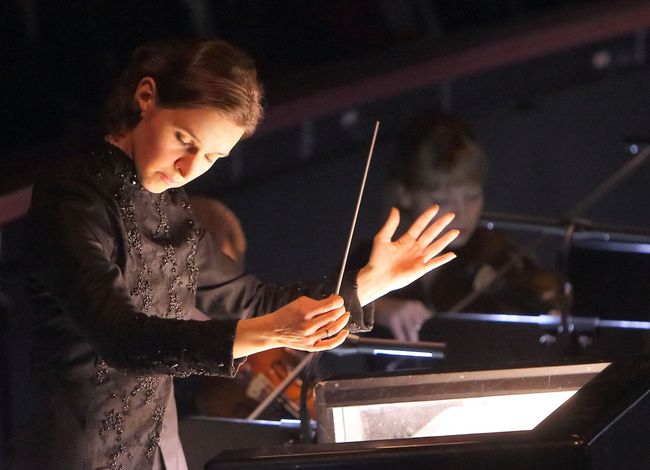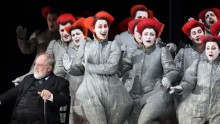Everything that unites people and helps their mutual understanding is becoming especially valuable in modern complicated world. Classical music is universally important in terms of this. Venezuela conductor and composer Jose Antonio Abreu understood this 40 years ago and developed a daring project of music revolution, able to change and cure the young generation that has been thrown to the sidewalk of life. He expressed an opinion that an orchestra is a perfect model of harmonious human relations. Joint participation in orchestra performing, with this habit being fostered since early age, not only leads children and teenagers into the rich world of music, but also shapes their collective conscience, aimed at spiritual values. It is worth quoting Dr. Abreu: “Playing together. An orchestra becomes a community, even a society. This society must be inspired by high ideas and merge with the family of similar ones.” I drew parallels with Venezuelan experience while I was attending this year’s famous Munich Opera Festival.
By far every festival show has practically become a demonstration of the key idea of the “international community of musicians.” It always brought perfect results, when the best performing forces from different countries were united. The names of famous conductors involved in preparing and holding of festival projects include a representative of Lviv conductor’s school Oksana Lyniv. Her previous experience includes independent conductor’s steps at Odesa Theater of Opera and Ballet, a position of the head of Bamberg Symphony Orchestra, Germany. It is indicative that with her recent orchestra she performed and recorded at the order of the German Radio Borys Liatoshynsky’s Third Symphony, she is sure that the work of the outstanding Ukrainian composer must be popularized more among the Western audiences. Today Oksana works at Bavarian State Opera, one of the most prestigious repertoire opera theaters of the world. At this year’s festival Oksana Lyniv was a staging conductor of the opera by modern Danish composer Poul Ruders Selma Jezkova. The opera was created in 2007 based on the film by Lars von Trier, Dancer in the Dark. I will mention that the musical film tells about a dramatic fate and tragic final of a singer who was catastrophically losing her eyesight and was going through hard life tests. The opera by Poul Ruders, which is one of the most often performed Danish composers in the world, took place in the culture complex Alte Kongresshalle. Apart from that, Oksana Lyniv was entrusted with staging Gaetano Donizetti’s Lucia di Lammermoor at the festival for the main stage. This work has been considered for a long time a calling card of the National Opera of Ukraine thanks to the unmatched talent of Yevhenia Miroshnychenko, who played the leading part. And in Munich performance, which was held with success by a representative of Ukrainian music culture, the interest of the audience was stimulated by the performance of German coloratura soprano Diana Damrau as Lucia. Over 20 years of successful career this singer has won many awards and honorary titles. In different years she was called the star of the year, the rose of the year, and her art won prizes and awards.

TODAY A REPRESENTATIVE OF LVIV SCHOOL OF CONDUCTORS OKSANA LYNIV IS WORKING AT BAVARIAN STATE OPERA, ONE OF THE MOST PRESTIGIOUS REPERTOIRE OPERA THEATERS IN THE WORLD / Photo from the website IOA-MANAGEMENT.COM
The Munich Opera Festival is constantly forming and renewing its “star list” of outstanding opera singers of world renown. The Mohicans whose names have been present on the billboards of the Bavarian State Opera included Edita Gruberova (Slovakia), Vesselina Kasarova (Bulgaria), Paata Burchuladze (Georgia), and Anatolii Kocherha (Ukraine). Over the recent years Kristine Opolais, a young charming singer from Latvia, appeared in the bouquet of unique female voices next to outstanding German soprano Anja Harteros. At this year’s festival I heard her in the leading part in Puccini’s opera Manon Lescaut. In this performance, staged by German director of old generation Hans Neuenfels, who is known for his numerous provocations, she performed in the duo with the most popular German tenor Jonas Kaufmann. At first Russian Anna Netrebko was appointed to this role, which requires not only perfect vocal abilities, but also good-looking appearance, femininity, and the power of dramatic passions in the final scene. Kristine Opolais turned out to be a worthy rival, although she has quite a chamber voice, and the entire complex of her vocal abilities nature make her fit the type of Puccini’s slim characters capable of wild passions. As for the show, it is based on a sharp contrast of not color rich, black-and-white graphics of love and dramatic scenes and grotesque solution of background and genre episodes on the verge of kitsch. The director blames for the tragedy of the heroine the spoiled social morality, the men, the owners of the world, who treat a woman as an expensive toy, a subject of manipulation. However, the positive spirit of the play is in assertion of invincible power of the pure devoted love of Chevalier Des Grieux, whose touching image was perfectly recreated by Jonas Kaufmann. The international lineup was present in the second play too, Verdi’s opera Don Carlos, which I couldn’t attend. It was conducted by Israeli Asher Fish, the leading role was played by Korean tenor Alfred Kim, and the role of faithful friend of Carlos and fighter for justice, Marquis de Posa was performed by Italian baritone Simone Piazzola, the part of Princess of Eboli was played by Russian singer Anna Smirnova, and the complicated bass part of the Great Inquisitor was entrusted to Pole Rafael Siwak. However, the main load was carried in this quite gloomy play, full of symbolism and focused on exposing the tyrant pressure on the personality of the despotism of secular and spiritual power, famous German opera stars, such as bass baritone Rene Pape (King Philippe) and soprano Anja Harteros (Elizabeth).
Incidentally, open air actions called “Opera for All” are traditionally held on the Max-Joseph-Platz. Except for the opera and ballet premieres, there are also chamber vocal concerts and vocal master classes, as well as symposiums on the questions of music theater are also held there. The forum is very popular with the audience, which comes not only from other cities, but other countries too.







